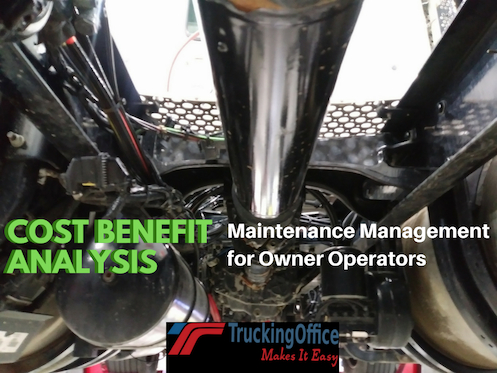CVSA Inspections will focus on steering and suspension this year – only a month from now on June 4-6. We think that probably puts maintenance management high on your priority list in the next 4 weeks.
Maintenance Management
Are you taking the week of the CVSA inspections off? We know there are truckers who do. That does make it better for the truckers who are confident in their equipment – they may pick up some extra loads that week. What if those are your loads and they’re gone forever?
Maintenance management is consistently one of the biggest concerns for owner operators. The trucking industry rolls on wheels and transmissions that have to be maintained for safety.
But it’s the cost-benefit analysis that should concern owner-operators the most.
Cost-Benefit Analysis
It sounds complicated and requires upper-level math, but actually, we do cost-benefit analysis every day in some aspects of our lives. Is it better to buy fuel in this state or in that state? Should we invest in a new toolset or just replace the one that broke? Should we eat at McDonald’s and get back on the road or take a nap at the truck stop for an hour?
Cost-benefit analysis is well named. You look at the costs you will pay to get a certain benefit in the end. If you have to make a decision, you can compare the cost-benefit analysis of two or more sets of information.
Cost-benefit analysis took a bad hit in the 70s when Ford used the method to make a very bad decision regarding the its model, the Pinto. Their decision doesn’t make the method bad – but it’s a good example of using good data to make a bad decision. Cost isn’t always the most important factor – but it can be a driving one (pun intended.)
Making Maintenance Management Decisions
There are some expenses that truckers have to pay regardless of the timing. Brakes go out – you get new brakes. That’s obvious. But some maintenance expenses can be pre-planned. Based on mileage, you can expect when you’ll need to change the oil or replace the tires.
- You can decide to take the risk and stretch out your maintenance tasks. Postponing the oil change? Maybe you want to wait another 10,000 miles because you’ll be able to afford it then- but what are the potential consequences?
- The ELD stops working – do you replace it at the next truck stop or contact the company and run the risk of getting pulled over before the replacement arrives?
Cost-benefit analysis is about managing risk. Maintenance of your rig is vital to staying on the road to make money – it’s not something you want to gamble on, but sometimes truckers have to accept the risks.
Assessing Your Risks
Often you need to put together a lot of data to make a decision. In trucking, there’s a lot of data available to you because we have to track so much:
- miles/mileage per state
- fuel/fuel purchases
- delivery times
- Hours of service
You can’t ignore the knowledge and wisdom you’ve gained with the miles you’ve driven. Then there are often off-the-road considerations to decisions. We could call that the “lifestyle” factors.
A simple chart can help. Make a list of all of the considerations for your first option: financial, data, experience, and lifestyle on a page, and start another page for the next option. Handwriting these lists helps more than using a computer and a spreadsheet. Taking the time to write out the data and considerations gives you more opportunity to think. As you write, more ideas may come to mind.
If you’re looking for data about your owner-operator trucking business – you don’t have to look any further than a good trucking management software like TruckingOffice. Our extensive reports will give you the data you need from your business history to help you make good decisions about your truck’s maintenance as well as track what’s been done in the past and when to schedule it in the future. So if you’re looking for a software program for your trucking business – consider a free trial of TruckingOffice TMS – the trucking management software solution for your trucking questions.







Recent Comments